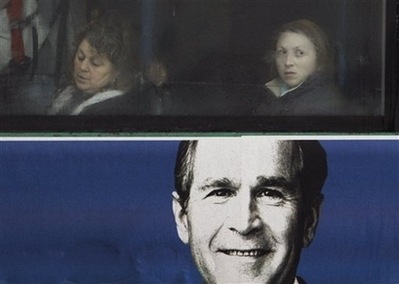国际英语新闻:Mideast leaders to address core issues
JERUSALEM -- The Israeli and Palestinian leaders agreed Tuesday to begin tackling the core issues of a peace agreement in a push to revive stalled negotiations ahead of the arrival of President Bush.
|
The renewed peace talks, formally launched at a conference in November in Annapolis, Md., are a centerpiece of Bush's agenda in his last year of office. But negotiations have made little headway, marred by Israeli construction plans in disputed territory and Palestinian militant attacks in the West Bank and Gaza Strip.
"We think the visit is an opportunity to energize the momentum of the post Annapolis dialogue between us and the Palestinians," Israeli government spokesman Mark Regev said.
Also Tuesday, a pair of Lebanese rockets struck a northern Israeli town before dawn, the second strike from across the border since Israel's summer 2006 war with Lebanese Hezbollah guerrillas. No one took responsibility for the attack. United Nations spokeswoman Michele Montas said UN officials had begun investigating the rocket fire, and she did not dispute the notion that the rockets may have been fired from an area where UN peacekeepers operate.
At their meeting, Israeli Prime Minister Ehud Olmert and Palestinian President Mahmoud Abbas pledged to have negotiators begin work immediately on the so-called final status issues. These issues include the final borders between Israel and a future Palestinian state, competing claims to the holy city of Jerusalem, the fate of millions of Palestinian refugees and Israeli security concerns.
Both Regev and Palestinian negotiator Saeb Erekat said the two leaders authorized their chief negotiators "to conduct direct and ongoing negotiations on all the final status issues."
"The president (Abbas) urged that the year of 2008 be a year of peace," Erekat said.
Both Israeli and Palestinian officials said their decision to begin work on the conflict's deepest issues was influenced by the Bush visit.
The Palestinians are furious about Israeli plans to build new housing in east Jerusalem and the West Bank -- areas captured by Israel in the 1967 Mideast war and claimed by the Palestinians for their future state.
Israel, for its part, has demanded that Palestinian forces do more to rein in militants in the West Bank. Since Olmert and Abbas last met, two Israelis were killed in the West Bank, and Israeli security forces blame members of Abbas' Fatah movement.
"The Palestinians need to do everything they can to fight terror. Israel frankly needs to look at its road map obligations and to do nothing that would prejudge the final status agreement," Secretary of State Condoleezza Rice, who will be accompanying Bush, told Israel's Channel 10 TV.
The U.S.-backed "road map" peace plan requires Israel to freeze settlement construction and the Palestinians to crack down on militants.
During Tuesday's meeting, the Palestinians called on Israel to halt settlement activity and urged Israel to stop carrying out military operations such as last week's raids on the West Bank city of Nablus, saying it damaged Abbas' credibility on the Palestinian street.
Israel says it cannot relinquish security responsibilities to the Palestinians because they are not ready.
Further casting a shadow over peace efforts is the Hamas militant group's control of the Gaza Strip. Hamas seized the area last June after routing Abbas' forces.
The group, which is committed to Israel's destruction, opposes the US-led peace efforts. While talking peace with Abbas, Israel conducts military operations in Gaza almost every day to halt rocket-launching squads. Dozens of militants have been killed in recent weeks.
In Gaza, Hamas said it would hold a rally against the Bush visit on Wednesday.
"You killer of children, go. You are not welcome in the Holy Land," Hamas said in a leaflet.
Israeli hardliners critical of Bush's peace efforts put up posters on a main Jerusalem road showing Bush, Olmert and Israeli President Shimon Peres wearing traditional Arab headdresses, under the title, "Accomplices to Terror." Police said they detained six people who put up the posters for questioning.
Israeli police, meanwhile, were preparing for a major deployment for Bush's visit. In all, 10,500 police, including 9,000 brought in from other areas of the country, will be stationed across the city, police chief Micky Rosenfeld said.
Main streets across Jerusalem were to be closed at midnight, snarling traffic for the city's 750,000 residents.
The military said that as an added security precaution it was barring all entry to Israel by Palestinians, from midnight Tuesday until after Bush leaves Friday.
In the West Bank town of Ramallah, Abbas' headquarters were painted inside and out, and a main courtyard was repaved.
相关文章
- 欧美文化:Sri Lankan military authorized to maintain law, order amid unrest
- 欧美文化:Russian FM visits Algeria to mark 60th anniversary of ties
- 欧美文化:Turkey, Kazakhstan aim to reach 10 bln USD in bilateral trade: president
- 欧美文化:Serbia, China commemorate journalists killed in NATO bombing 23 years ago
- 欧美文化:UN chief calls for end to "cycle of death, destruction" in Ukraine
- 欧美文化:Nearly 15 mln deaths directly or indirectly linked to COVID-19: WHO
- 欧美文化:Killings in U.S. Los Angeles on pace to top last year's high: media
- 欧美文化:South Sudan ceasefire may unravel due to hostilities: monitors
- 欧美文化:Zambia launches mechanism to accelerate private sector development
- 欧美文化:Ukrainian, EU leaders discuss further support for Kiev





 手机网站
手机网站